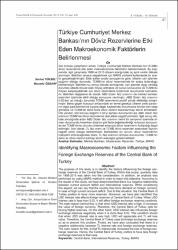| dc.contributor.author | Yüksel, Serhat | |
| dc.contributor.author | Özsarı, Mustafa | |
| dc.date.accessioned | 08.07.201910:49:13 | |
| dc.date.accessioned | 2019-07-08T20:18:34Z | |
| dc.date.available | 08.07.201910:49:13 | |
| dc.date.available | 2019-07-08T20:18:34Z | |
| dc.date.issued | 2017 | en_US |
| dc.identifier.citation | Yüksel, S. ve Özsarı, M. (2017). Türkiye Cumhuriyet Merkez Bankası’nın döviz rezervlerine etki eden makroekonomik faktörlerin belirlenmesi. Finans Politik ve Ekonomik Yorumlar Dergisi, 54(631), 41-54. | en_US |
| dc.identifier.issn | 1307-7112 | |
| dc.identifier.issn | 2667-6907 | |
| dc.identifier.uri | https://hdl.handle.net/20.500.12511/371 | |
| dc.description.abstract | Söz konusu çalışmanın amacı Türkiye Cumhuriyet Merkez Bankası'nın (TCMB) döviz rezervlerine etki eden makroekonomik faktörlerin belirlenmesidir. Bu kapsamda, ilgili çalışmada 1988 ve 2015 dönem aralığındaki üç aylık veriler dikkate alınmıştır. Belirtilen amaca ulaşabilmek için MARS yöntemi kullanılarak bir analiz gerçekleştirilmiştir. Elde edilen analiz sonuçlarına göre, ülkenin cari işlemler açığının olduğu durumda, TCMB'nin döviz rezervlerinde bir azalış bulunduğu belirlenmiştir. Belirtilen bu sonuç dikkate alındığında, cari işlemler açığı verildiği durumda ülkede dövize olan ihtiyaç artmakta ve bunun sonucunda da TCMB bu ihtiyacı karşılayabilmek için döviz rezervlerini kullanmak durumunda kalmaktadır. Belirtilen değişkene ek olarak, ABD Doları faiz oranının da merkez bankası rezervleri üzerinde etkili olduğu sonucuna varılmıştır. ABD Doları faiz oranının 5.02'den az olduğu durumda TCMB rezervlerini pozitif yönde etkilediği anlaşılmıştır. Bahsi geçen hususun arkasındaki en temel gerekçe ülkenin yerel parasının diğer para birimlerine kıyasla değer kaybetmesi durumunda dövize olan talep artmakta ve TCMB'de daha fazla döviz rezervi bulundurmayı tercih etmektedir. Öte yandan, söz konusu değerin 5.02'yi aşması durumunda ise, ABD Doları faiz oranının TCMB'nin döviz rezervlerine olan etkisi negatif yönlüdür. İlgili sonuç dikkate alındığında artan ABD Doları faiz oranının belirli bir seviyenin üzerinde olması durumunda Amerikan dolarını çok fazla değerlendirdiği ve bunun sonucunda ise TCMB'nin bu durumu önlemek amacıyla döviz rezervlerini kullandığı tespit edilmiştir. Son olarak, TL faiz oranı ve TCMB döviz rezervleri arasındaki ilişkinin negatif yönlü olduğu belirlenmiştir. Bahsedilen bu durum, döviz rezervlerinin maliyetini arttıracağından ötürü, TL faiz oranının artması durumunda, TCMB'nin daha az döviz rezervi tutmayı tercih edeceğini göstermektedir. | en_US |
| dc.description.abstract | The purpose of this study is to identify the factors influencing the foreign exchange reserves of the Central Bank of Turkey. Within this scope, quarterly data for 1988-2015 was taken into the consideration. In addition, an analysis was performed by using MARS method in order to reach this objective. According to the results of this study, we have determined that there is a negative relationship between current account deficit and international reserves. While considering this aspect, we can say that the country has more demand on foreign currency in case of high current account deficit. Due to this situation, the Central Bank of Turkey prefers to have more reserves. Moreover, we have also identified that USD interest rate affects foreign reserves of Central Bank of Turkey. When USD interest rate is less than 5.02, it will affect foreign exchange reserves positively. The main reason behind this, is that when USD interest rate is high, it increases the value of foreign currency. Therefore, the Central Bank of Turkey opts for having higher reserves. On the other hand, USD interest rate influences foreign exchange reserves negatively when it is more than 5.02. This condition shows that when USD interest rate is very high, USD will appreciate and TL will lose value. Therefore, the Central Bank of Turkey uses its foreign exchange reserves so as to prevent this problem. Finally, we have also concluded that there is a negative relationship between TL interest rate and foreign exchange reserves. The main reason for this, is that TL interest rate increases the cost of foreign exchange reserves. Hence, the Central Bank of Turkey prefers to have less foreign exchange reserves in that case. | en_US |
| dc.language.iso | tur | en_US |
| dc.rights | info:eu-repo/semantics/openAccess | en_US |
| dc.subject | Merkez Bankası | en_US |
| dc.subject | Uluslararası Rezervler | en_US |
| dc.subject | Türkiye | en_US |
| dc.subject | MARS | en_US |
| dc.subject | Central Bank | en_US |
| dc.subject | International Reserves | en_US |
| dc.subject | Turkey | en_US |
| dc.subject | MARS | en_US |
| dc.title | Türkiye Cumhuriyet Merkez Bankası’nın döviz rezervlerine etki eden makroekonomik faktörlerin belirlenmesi | en_US |
| dc.title.alternative | Identifying macroeconomic factors influencing the foreign exchange eeserves of the Central Bank of Turkey | en_US |
| dc.type | article | en_US |
| dc.relation.ispartof | Finans Politik ve Ekonomik Yorumlar Dergisi | en_US |
| dc.department | İstanbul Medipol Üniversitesi, İşletme ve Yönetim Bilimleri Fakültesi, Uluslararası Ticaret ve Finansman Bölümü | en_US |
| dc.authorid | 0000-0002-9858-1266 | en_US |
| dc.identifier.volume | 54 | en_US |
| dc.identifier.issue | 631 | en_US |
| dc.identifier.startpage | 41 | en_US |
| dc.identifier.endpage | 54 | en_US |
| dc.relation.publicationcategory | Makale - Ulusal Hakemli Dergi - Kurum Öğretim Elemanı | en_US |


















